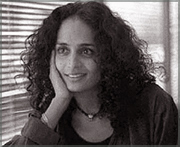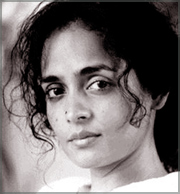|
observer |
|
|
|
|
|
OTHER LINKS |

|

|

|
With the world..."My mother says that some of the incidents in the book are based on things that happened when I was two years old. I have no recollection of them. But obviously, they were trapped in some part of my brain." Suzanna Arundhati Roy was born on the 24th November 1961, the child of a marriage between a Christian woman from Kerala and a Bengali Hindu tea planter. It was not a happy marriage and she is unable to speak of her father without difficulty. "I don't want to discuss my father. I don't know him at all. I've only seen him a couple of times, that's it," she told Sunday Plus when pressed.
Arundhati spent her crucial childhood years in Aymanam. There, her mother Mary Roy (later a well-known social activist) ran an informal school named Corpus Christi where Arundhati developed her literary and intellectual abilities unconstrained by the set rules of formal education. Aymanam is no longer the old-fashioned village of the sixties in which the novel is set. It is now a bustling extension of Kottayam town, with 7,000 houses and a rash of dish antennae. Paradise Pickles still exists. Social prejudices have dissolved to great extent, though an affair between a low caste man and an upper caste woman can still cause quite a flutter. "A lot of the atmosphere of A God of Small Things is based on my experiences of what it was like to grow up in Kerala. Most interestingly, it was the only place in the world where religions coincide, there's Christianity, Hinduism, Marxism and Islam and they all live together and rub each other down.
When I grew up it was the Marxism that was very strong, it was like the revolution was coming next week. I was aware of the different cultures when I was growing up and I'm still aware of them now. When you see all the competing beliefs against the same background you realise how they all wear each other down. To me, I couldn't think of a better location for a book about human beings." The rural environment was also important. "I think the kind of landscape that you grew up in, it lives in you. I don't think it's true of people who've grown up in cities so much, you may love building but I don't think you can love it in the way that you love a tree or a river or the colour of the earth, it's a different kind of love. I'm not a very well read person but I don't imagine that that kind of gut love for the earth can be replaced by the open landscape. It's a much cleverer person who grows up in the city, savvy and much smarter in many ways. If you spent your very early childhood catching fish and just learning to be quiet, the landscape just seeps into you. Even now I go back to Kerala and it makes me want to cry if something happens to that place." She says that she was never "part of this safe world where you grow up and then are married and sent off. You know it's actually terrifying for people and in many ways I escaped that. Having an arranged life and being sent off to some stranger's house. But on the other hand escaping that meant watching it from the outside and not knowing exactly what would happen to you." "I grew up in very similar circumstances to the children in the book. My mother was divorced. I lived on the edge of the community in a very vulnerable fashion. Then when I was 16 I left home and lived on my own, sort of... you know it wasn't awful, it was just sort of precarious... living in a squatter's colony in Delhi." "When I think back on all the things I have done I think from a very early age, I was determined to negotiate with the world on my own. There were no parents, no uncles, no aunts; I was completely responsible for myself." Arundhati Roy left home at 16 and then lived in a squatters' camp, in a small hut with a tin roof, within the walls of Delhi's Ferozshah Kotla. She made a living selling empty beer bottles. It was six years before she saw her mother again. Eventually, Roy joined the Delhi School of Architecture, moonlighting as an architect's artist. She married a fellow architecture student, Gerard Da Cunha. Their marriage lasted four years. At this stage, neither had a great love for architecture and so they quit. "We went off to Goa because we decided that we would be flower children. We would make cake and sell it on the beach and make a living that away. Gerard was really an incredible person so we could do it for seven months but then I found I couldn't take it anymore. I couldn't take the tourists." Returning with no money, she sold a ring which a friend had given her at a fruit juice shop for Rs300 and a banana shake. She took a job at the National Institute of Urban Affairs, found a barsati near the dargah at Nizamuddin and hired a bicycle, "It cost Rs2 a day and it was better than going by bus." The film director Pradeep Krishen saw her cycling down a street and offered her a small role in Massey Saab - "I played the tribal bimbo" - which she accepted, after initial reservations, more out of curiosity than anything else. But they had barely got to know each other when she got a scholarship to go to Italy for eight months to study the restoration of monuments. She realised she was a writer during those months in Italy. She linked up with Krishen, now her husband, and they planned a 26 episode television epic for Doordarshan called the Banyan Tree. The independent production company ITV advanced the money. Unfortunately, they had only shot enough footage for three or four episodes when ITV scrapped the serial. "That was a real heartbreak," she says. However, Bhaskar Ghose, then director-general of Doodarshan, met Roy who told him that she wanted to write but that she didn't think anyone would finance her kind of screenplays. "I will," said Ghose. And he did. The result was the film ' In Which Annie Gives It Those Ones'. Roy then scripted Electric Moon for Channel 4 in 1992 and though the movie had its fans, it was not a success. Roy concurs: "The movie I had in my head and different from the one we shot," she explains. "I wanted it to have a more anarchic quality, but I didn't know enough about cinema to make that come through on screen." The film did however lead to Arundhati's first published piece. "When I came back after Electric Moon, there were a lot of things that I needed to sort out in my own mind. Writing about them was how I coped with it. I was glad when Sunday published the piece. But I didn't write it for people to read. I wrote it for myself." Her next piece of writing was to result in considerable controversy - being a criticism of Shekar Kapur's celebrated film 'Bandit Queen', about Phoolan Devi. The controversy escalated into a court case, after which she retired to private life to concentrate on her writing, which eventually became The God of Small Things. "Ever since as a child I knew that people had to do things when they grew up, I knew that I wanted to be a writer" Inspiration The inspiration for the book was not an idea or a character but an image - "the image of this sky blue Plymouth stuck at the railroad crossing with the twins inside and this Marxist procession raging around it." The rest of the story did not just accidentally fall into place however, "..so much of fiction is a way of seeing, of making sense of the world ..and you need a key of how to begin to do that. This was just a key. For me (the novel) was five years of almost changing and mutating, and growing a new skin. It's almost like a part of me." "I didn't know what I'd started really, I got a computer and started using it, finding out what it could do. I didn't know I was writing a book for a while. It took me five years to write The God of Small Things, but for first few months I was just fooling around before I realized what was happening and got down to writing the book properly." |










